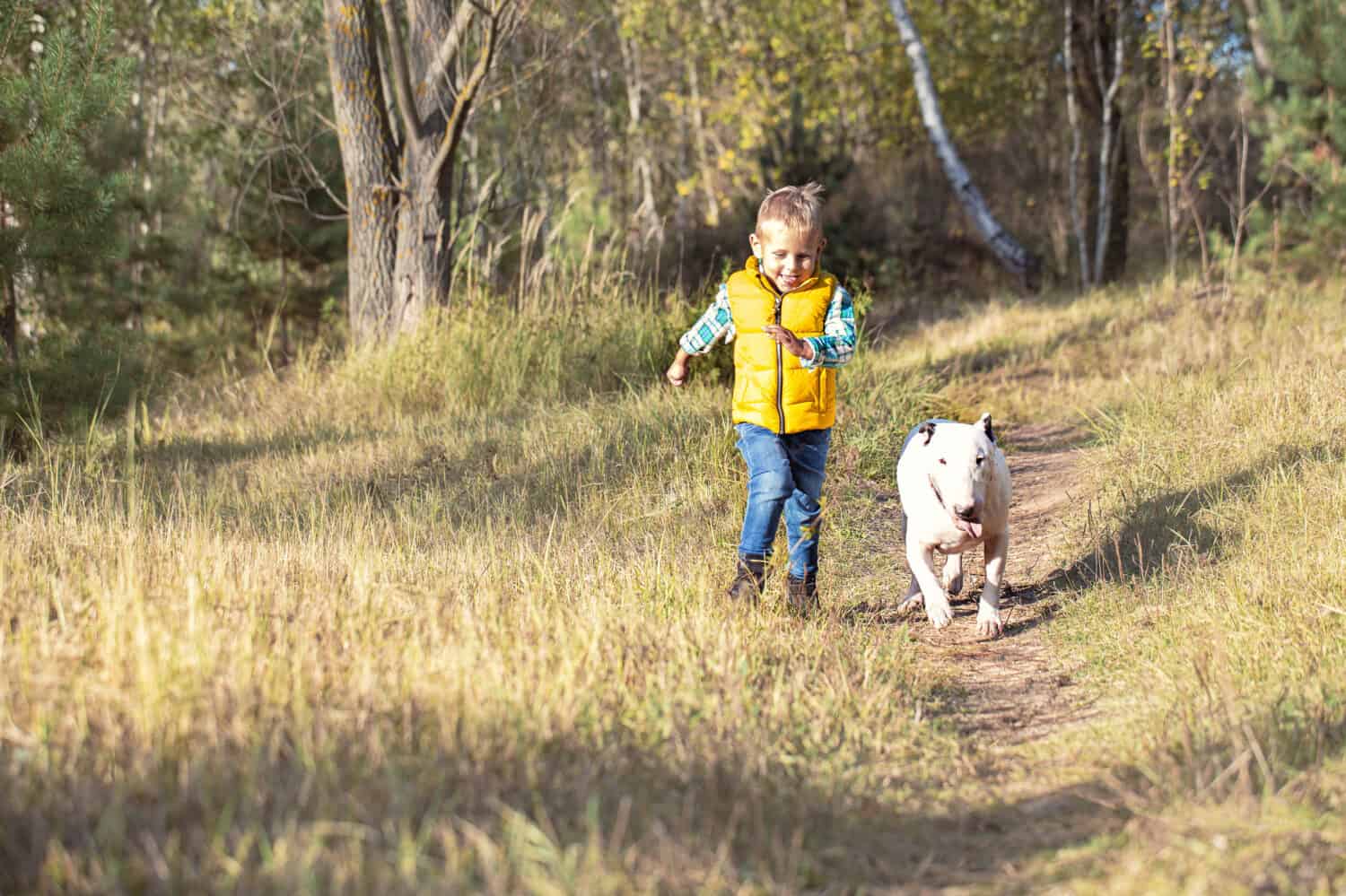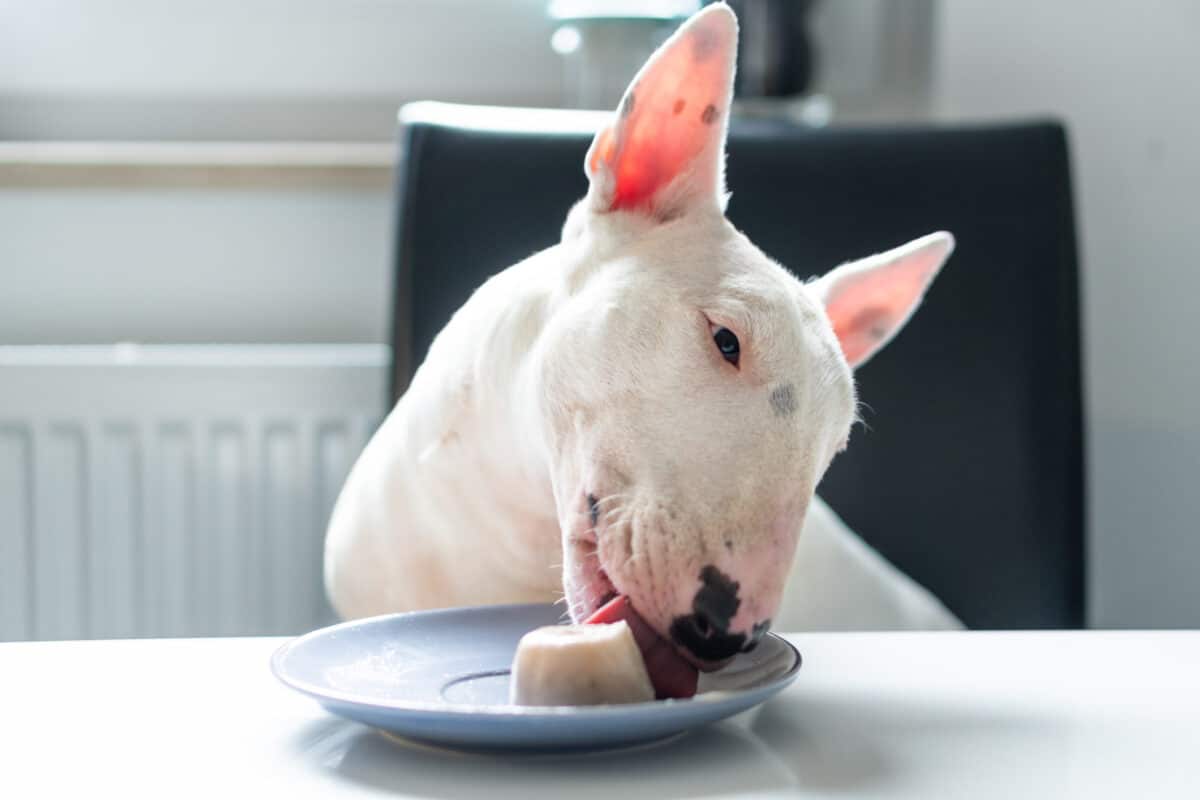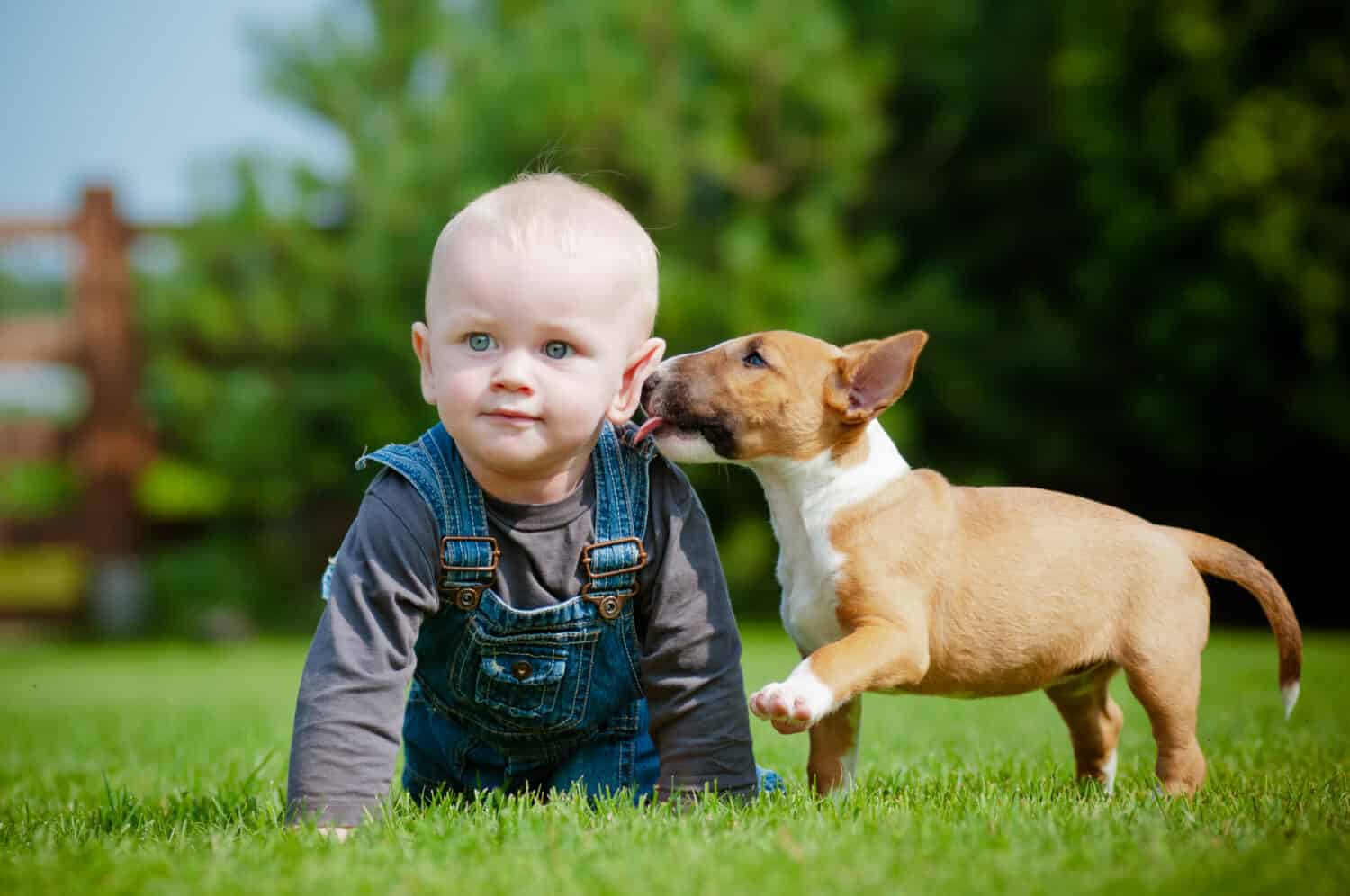When you think about getting a dog that fits well with your family, one of the most important things you'll want to consider is if it'll be good with your kids. You want a breed that's friendly, loyal, and most importantly, safe to be around.
A bull terrier is known for its mischievous, energetic, and loyal personality. But is it safe for kids? And how will you know it'll be a good addition to your family? While this breed can be aggressive and stubborn at times, with the right training and socialization, they can also be a great pet and good with kids! Especially older kids who know how to respect this breed and like to help it burn off its energy. Here's everything you need to know about bull terriers.
Bull Terrier Temperament and Personality
Bull terriers are known for their signature egg-shaped face and highly energetic personality. They can sometimes be stubborn as well and require assertiveness and structure at home. If you're thinking about adding a Bull Terrier to your family, here are a few things to keep in mind.
History of the Bull Terrier
According to the American Kennel Club, the bull terrier began as a cross between a bulldog and a terrier. This breed is actually a combination of many breeds and was created by James Hinks of Birmingham, England in the 19th century. This breed was first shown at a dog show in May of 1862. It was nicknamed the “White Cavalier” for its signature white coat, and its calmer demeanor.
Today, this breed still has its signature egg-shaped head, but colors have been added to the breed to create colored markings of different kinds. Famous people like President Theodore Roosevelt and George S. Patton are known for owning these dogs throughout history. This breed was also mentioned in Charles Dickens' novel, Oliver Twist. And, if you're familiar with Target, you know that this breed is the store's famous mascot.
Physical Traits
As mentioned, the bull terrier breed is known for its uniquely shaped head. Some compare the head to that of a shark. They also have a muscular build and tend to have a smooth, shiny coat. Their coloring can range from all-white to white with brown markings.
This breed is also medium-sized, larger than a lap dog, but smaller than larger breeds like German shepherds. They can weigh between 50 and 70 pounds and stand about 21 inches tall at the shoulder.
Personality
The bull terrier breed is known for being playful, affectionate, and outgoing. They can even be goofy at times and are best suited for highly active families as they require a lot of exercise. While they also require consistent training and early socialization, their loyal and protective demeanor can make them great family dogs.
These dogs also don't like to spend long periods alone. And, if you don't have a strong set of rules, they will make up their own. Don't let this discourage you from owning this breed, however! If you can strongly (but kindly) enforce your house rules and provide your dog with energetic play, these “busy” dogs will fit right in.

©TheFarAwayKingdom/Shutterstock.com
Care for a Bull Terrier
As with any dog, a bull terrier requires training and care. This breed especially needs lots of exercise and early and consistent training. Here's everything you need to know about caring for your bull terrier from puppy to adulthood.
Training
As we've mentioned, bull terriers require much training. This breed can be aggressive toward other animals, especially dogs of the same sex, so it's important to take them to puppy socialization classes as early and often as possible. You can also crate train your bull terrier to keep them (and your home) safe when you can't be with them.
This breed can also be challenging to house train. Consider following a house training program and using positive reinforcement techniques. The key is to keep the training fun and playful. If this breed isn't having any fun, they won't be interested in participating due to their strong-willed nature.
Nutrition
Bull terriers require high-quality dog food. They are also prone to obesity so it's important to not overfeed your dog with food or treats. How much they eat depends on their age, size, and activity level, so your dog may need more or less than other bull terriers.
It's also important to understand what they can and can't have. WebMD provides a list of food that dogs should never eat. Also, you may want to consider a safe place for your bull terrier to go when you're not at home. This breed gets bored easily and will eat almost anything when they have free range of the house.

©iStock.com/24K-Production
Exercise
Bull terriers require lots of exercise! This breed needs anywhere from 30 minutes to an hour of exercise a day and is best suited for families that are already active. You can take them on walks or play canine games with them in the backyard. Bull terriers love fetch, tug of war, and frisbee tosses.
Exercise helps to keep a bull terrier in good mental and physical health. As mentioned, this breed can get bored easily and will make up its own games and rules if left unattended. Bull terriers love to be with their owners and do whatever their owners are doing, so don't be afraid to include your dog in your family's activities.
Grooming
Because of the bull terrier's short and shiny coat, they don't require a lot of maintenance. You can brush their coat once a week to get rid of loose fur and keep their coat smooth. Keep in mind that more brushing may be needed if they are in a season of shedding.
Additionally, be sure to brush your bull terrier's teeth a few times a week to remove tartar buildup. And be sure to trim their nails to keep them from getting too long. You can do weekly ear checkups as well to keep them clean and catch any issues. As with all dogs, make sure to take them to yearly veterinary checkups, too.
Lifespan
A bull terrier can live to be 10-12 years old. With proper care, exercise, and nutrition, your dog can live a long and happy life.
How to Create a Successful Relationship Between a Bull Terrier and Your Family
In general, the bull terrier breed is loyal, affectionate, and great with kids! However, they do require proper training, preferably at a young age so they are familiar with your family. They also require lots of exercise to keep from developing bad habits or aggressive behavior.
Keep in mind that any behavioral problems from a bull terrier are generally the result of its early upbringing. Set limits and rules from the start and your bull terrier will become an amazing pet! Here are a few ways to make sure your kids and your bull terrier have a fun and loving relationship:
- Make sure your kids understand a few rules about life with a dog. Explain house rules like how they should not feed the dog from their plate or take the dog's food away.
- Teach your children to approach their bull terrier with love, respect, and gentle handling.
- Give your bull terrier space when needed.
- Socialize your dog early and often so that it gets used to everyone in the family at a young age.
- Play lots of games with your bull terrier! Activities, like fetch, tug of war, frisbee tosses, and walks at the park, can help your dog burn off some energy and remain calm at home.
Is a Bull Terrier Right for Your Family?
Bull terriers can be a wonderful addition to many families! Their loving, caring, and loyal demeanor makes them affectionate and protective. However, it's important to remember that you'll need patience as you welcome your new pet to the family. And, as with any new pet, you'll need to work on training and carefully monitoring your new addition before you leave it alone with your kids. This breed tends to blend in better with older children, as well, due to their active personality.
Up Next:
- Dog Age Chart to See How Old Your Pup Really Is
- Are Huskies Good with Kids? What Parents Need to Know.
- 13 Small Dogs That Are Good With Kids
- Are German Shepherds Good With Kids?
The image featured at the top of this post is ©otsphoto/Shutterstock.com.
